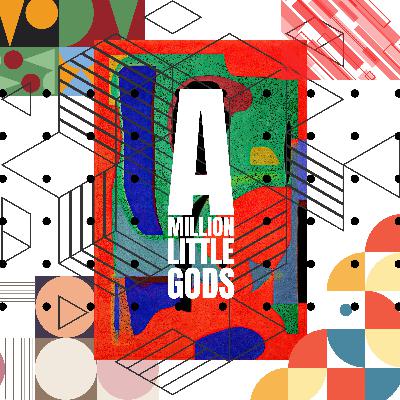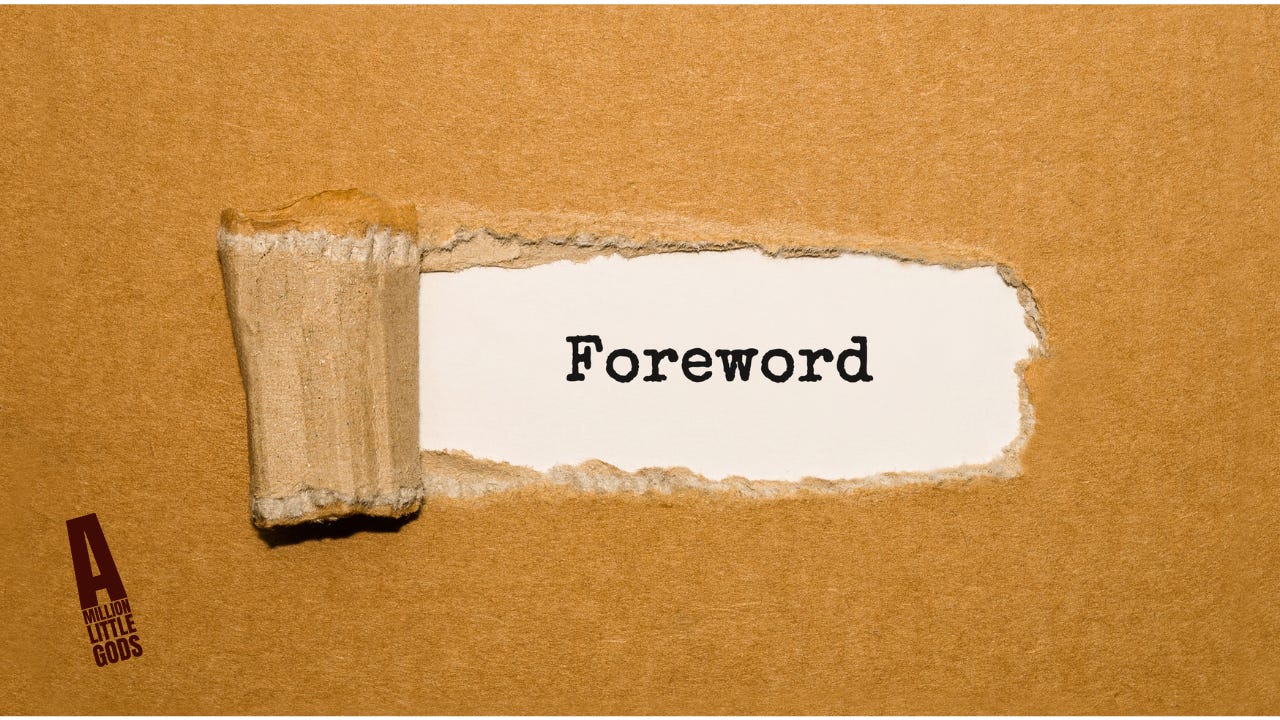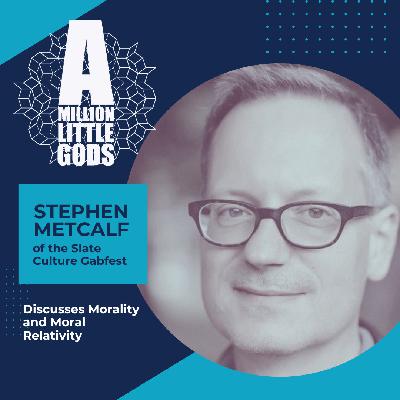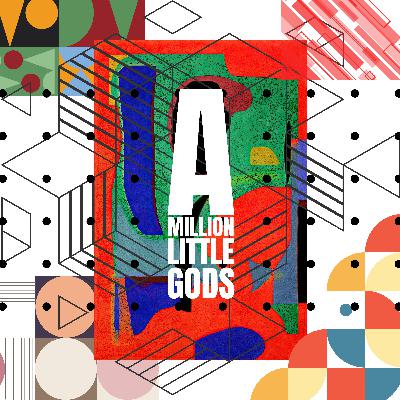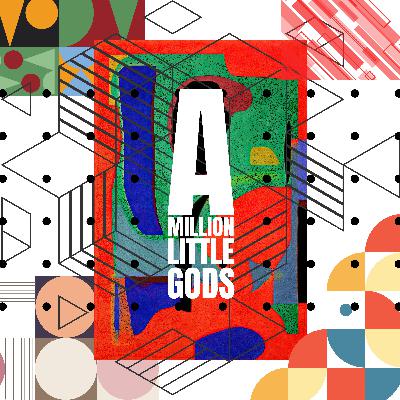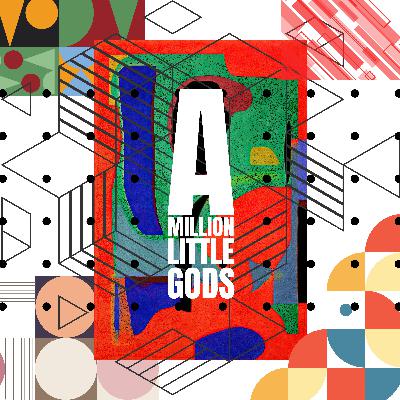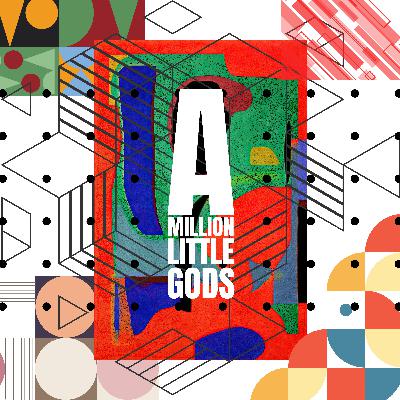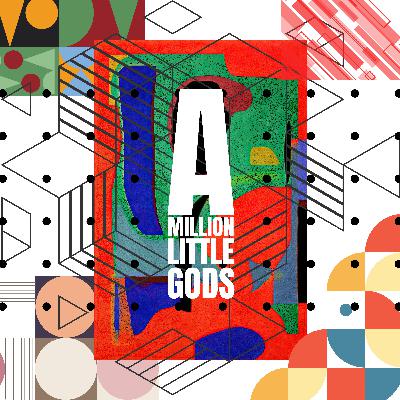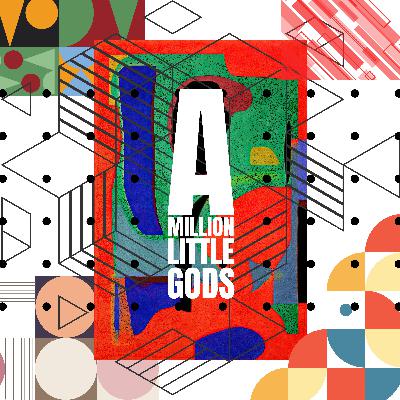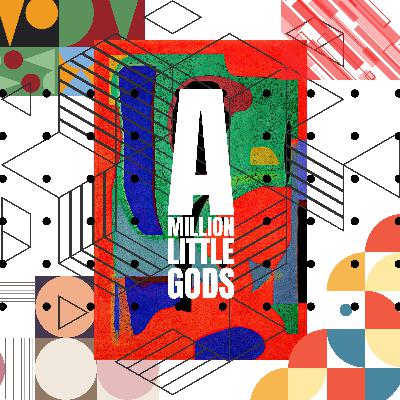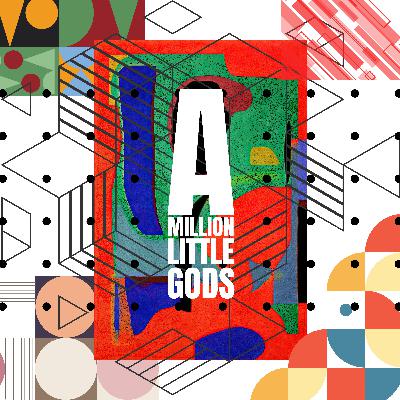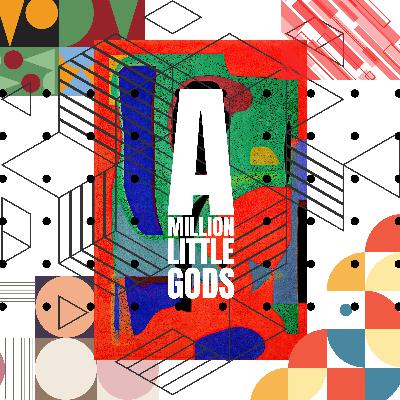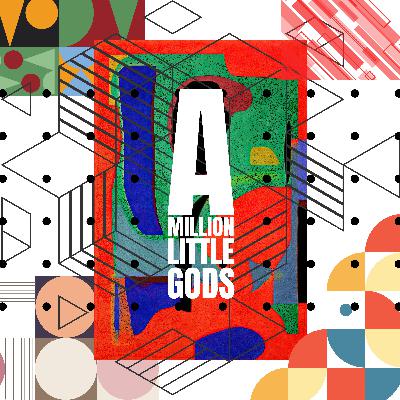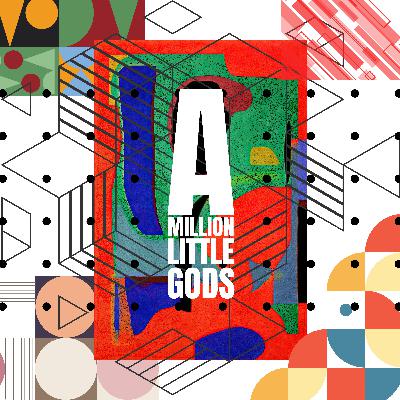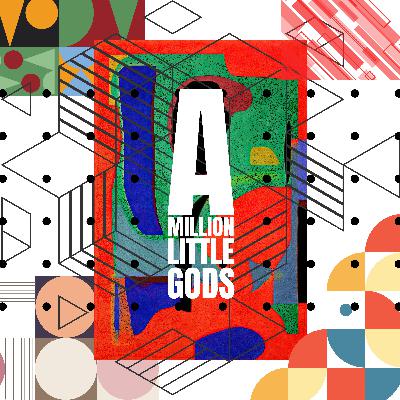Discover A Million Little Gods
A Million Little Gods

A Million Little Gods
Author: Aaron Gowen
Subscribed: 16Played: 688Subscribe
Share
© Aaron Gowen
Description
A Million Little Gods: A podcast on the consolation of uncertainty. It's about being of two—or more—minds about things and being okay with that. Hosted by Aaron Gowen of the Institute for English and American Studies at the University of Hamburg. amillionlittlegods.com
amillionlittlethoughts.substack.com
amillionlittlethoughts.substack.com
35 Episodes
Reverse
Cafe La Morenita. “The little dark-haired girl.” Ehn. Should’ve made Yerba Mate or something. All right, let’s get back to it.Once people around the world had finally caught on to the fact that they’d been the marks in a shell game they’d foolishly been betting on since the industrial revolution—that their personal labor had been structured within a set of legal and economic institutions and had been measured in standardized units (hours of work) that could be traded and sold on a market for a set value—they had reacted with . . . predictable indignation.You might think that I am alluding to another feature of the reality Perón found himself lodged in before the junta: “dialectical materialism”—what some call Marxism. And you certainly cannot explain Perón’s rise devoid of that half-baked theory of everything. But there is another way you can strike out on once you face up to the abuses suffered by the subservient.By the early 1940s, Communism, the purest distillation of Marxist thought, had long-since made its expansiveness apparent: Its most basic dictate—that the lowest level of human experience (the struggle for power and “material” possession) subsumes every other facet of human behavior—was voracious. Everything else—family bonds, career ambitions, fealty to nation, altruism, charity, . . . and (famoulsy) religion—was consumed in the monomaniacal maw of this basic principle, according to which human coexistence is necessarily impelled to one inevitable conclusion: a classless, stateless society where all property is collectively owned and wealth is distributed based on need.The adherents of this principle believed that some further evolutionary state hidden beyond the veil of those ends might be possible; but that we are culturally blind to that possible state because we cannot look past the aforementioned institutions: the state, the family, religion. In order to achieve those ends, the seductive phantasms of institutions holding them back had to be exposed and brought into synthesis with them.As you can imagine, the Catholic Church was not amused. It didn’t like being called an institution. It didn’t consider itself the work of humans at all. But much worse: to be rendered a mere diversion—to be labeled as priestly magicians, pressing made-up concerns to distract the people, all the while fleecing the people of their needs, and of the means to attain those needs, either for the gain of the Church itself or, worse yet, in the service of secular powers—that was more than flesh and blood could stand.Now, you can explain away this reaction as angry deflection or denial. “Of course the Church would resist such a conclusion,” you might say. And, well, maybe. Alternatively, I can call you a self-important cynic. What you might call deflation or reduction, I might call nihilism. Your psychologizing of the Church, or of the Clergy, presupposes the very things you are claiming are “merely” instruments of class domination: values, principles. Marx himself had wavered before leaning into “revolutionary materialism.” He was enthralled not merely by Hegel’s dialectic, but by his idealism.I’m just gonna help this guy out. So, you should note that when he says “idealism,” he doesn’t mean it in the common way people use it to mean having high ideals or aspirations. He’s using the philosophical term of art: The notion that our minds, our consciousness, our ideas—our values and principles—are real; and alternatively that reality is, at least somewhat, shaped by our minds and ideas.In Phänomenologie des Geistes, The Phenomenology of the Spirit, Hegel argued that we do indeed encounter the “things” of the world. They are outside of us. But we also “make” them, in every facet. Outside of our ideation they are never fully real. Their reality is tied to the process of our conceiving and understanding them. When we begin to understand the things we have conceived in thought as separate from us—and especially when we perceive ourselves as objects, separate from us—this is estrangement.However, Hegel contends that this process is, nevertheless, an essential part of our becoming complete selves—for the things of the world are separate from us; yet we are objects in the world. When we reconcile ourselves to this paradox, we are alienated, but we are free.Marx turned this idea on its head. In Ökonomisch-philosophische Manuskripte aus dem Jahre 1844, what in English we abbreviate as the 1844 Manuscripts, Marx borrowed the notion of “estrangement.” But where Hegel saw “alienation” as the positive version of estrangement—a stage in the development of self-consciousness—Marx saw only the worker's estrangement from labor, production, and ultimately, their human essence. And as he “matured,” Marx jettisoned ideas and self-consciousness altogether.He criticized Hegel for viewing ideas as the primary drivers of history, arguing instead that material conditions and economic structures determine consciousness. In the set of manuscripts by Marx and Engels (and probably a few others) that we call The German Ideology, they famously declare: “Es ist nicht das Bewußtsein der Menschen, das ihr Sein, sander umgekehrt ihr gesellschaftliches Sein, das ihr Bewußtsein bestimmt.” (“It is not the consciousness of men that determines their being, but, on the contrary, their social being that determines their consciousness.”)A Million Little Gods is a reader-supported publication. To receive new posts and support my work, consider becoming a free or paid subscriber.Unto the breach rode Gioacchino Vincenzo Raffaele Luigi Pecci. Alternatively known as Pope Leo XIII. From one perspective, it wouldn’t be wrong to say that Pope Leo wanted to provide the Church with a philosophical and theological bulwark against the encroaching influence of modern ideologies. You could of course think of him as a CEO whose one job is to secure the bottom line—butts in pews, knees on prie-dieux, pesos in collection baskets—for the red-cassocked board of directors. But that begs the question that was at hand: What was wrong with those ideologies?Hegel’s philosophy of reality as a dynamic unfolding of contradictions through thesis, antithesis, and synthesis—and especially his views on God and his nigh-on deification of historical progress—those didn’t sit well with Leo. But he understood where they were coming from. The diversity of beliefs, and the difficulty of living together in peace given that diversity, make Hegel’s model of reality appealing. If God is an end toward which things evolve, a self-directing principle that governs or animates reality; and if the truth itself evolves over time; then you can fudge your way through moral quandaries in God’s good graces. It was an enticing notion, but by Leo’s lights discernibly wrong.Meanwhile, Marx. Marxism denied the spiritual dimension of human existence altogether and placed the onus of virtuous “progress” on the struggle between the classes. If the good is simply all the means necessary to effect the revolutionary overthrow of capitalist structures, then there are no moral obligations for the lower classes—as long as they break the chains of oppression, whatever the lower classes do is, by definition, good.Leo believed this purely economic and materialist view of history dismantled any moral and metaphysical order. So in one of his first acts as Pope, he released the 1879 encyclical Aeterni Patris, which reintroduced the world to a figure once dismissed by the likes of Voltaire and Diderot, d’Holbach and Hume: St. Thomas Aquinas.It’s not enough to say Leo’s revival of Thomism was simply an academic preference; nor that it was a strategic intellectual or theological response to the challenges posed by Hegelianism, or Marxism, or logical positivism, or whatever other philosophical movement was ascendent in his day. Yes––unlike Hegel, who subordinated theology to philosophy; or Marx, who eliminated theology altogether––St. Thomas provided a balance, where reason supported faith rather than undermining it. And he reinforced the immutability of truth, particularly in metaphysics and ethics, which countered Hegel’s relativistic historicism and Marx’s radical materialism. But he did more than that. Leo believed Thomism offered a better response to that question of how to live together as diverse individuals in a system seemingly bent on stripping us of our individual spirits.The Enlightenment thinkers had disparaged Aquinas, Leo argued, because he represented medieval Scholasticism, natural law theology, and Aristotelian metaphysics, all of which they sought to replace with rationalism, empiricism, and secular political thought. But Leo argued that their own latter-day evolution into historicism, phenomenology, and dialectical materialism had proved that the Enlightenment’s priorities were a shallow soil that, no matter how long you left it to fallow, could bear no fruit. Leo believed St. Thomas had already foreseen Hegel’s insights, but had given a more elegant, more beautiful account. God is indeed an end.But the truth itself does not evolve.Aquinas built his metaphysical framework on participation (participatio), which means that all created beings derive their existence from God, who is Being Itself (Ipsum Esse Subsistens). Everything in creation possesses being by participation, meaning not that the world is God but shares in His existence. Thomas writes in the Summa Theologiae that Christ, as the Word (the Logos), is the principle of creation. Everything exists through Him, as confirmed in John 1:3: "Through Him all things were made; without him, nothing was made that has been made."Christ is not only the Creator but also the ultimate end (telos) of creation. His incarnation fulfills the divine purpose of history. The human soul is created with an intellectual and volitional capacity to receive God. Through grace, Christ becomes present within us. When a person receives grace, they receive a real but participatory share in
Uki Goñi was born in the United States. Much to the chagrin of folks whose political fortunes—and embarrassment of power—have lately been restored, that would normally mean that Goñi was an American citizen. But his father was an Argentine diplomat stationed at that country’s embassy in Washington, D.C. when he (Uki) was born. The 14th Amendment to the U.S. Constitution (the first section of which achieved enfranchising freed slaves) does state that anyone born on US soil is “subject to the jurisdiction thereof,” but it excludes the children of foreign diplomats from that jurisdiction.So, Uki Goñi spent most of his first 14 years living out an American childhood not unlike my own: saying the pledge of allegiance in the courtyard of his local Catholic parish’s parochial school; wearing that AAA Safety Patrol belt the neon color of candied orange peel, making sure his classmates didn’t jaywalk; and hearing stories every November about the exploits of captain Myles Standish, Squanto, Massasoit, and a bunch religious dissenters—who, if they agreed on one thing, it was that they didn’t like Catholics; but who also (crowded in the hull of a beat-up Dutch cargo fluyt anchored in what’s now Provincetown harbor, in November 1620) signed a compact that they would “covenant and combine [themselves] into a civil body politic for their better ordering and preservation.”But eventually the services of Goñi’s father were needed elsewhere, namely the Argentine diplomatic mission in Ireland. Just as his juices were flowing and his sense of self was taking shape, he landed in the middle of that country’s charms, and its notorious troubles. He was mostly sequestered from those convulsions, though, at a private prep school in Dublin; a place not devoid of its own darkness. His French teacher was dead-eyed and sadistic, and, as it turned out, was a native Breton who had enthusiastically joined the Nazi Schutzstaffel (the S.S.) in the Second World War and who was enjoying protection from prosecution for war crimes.The strange juxtaposition of earthy homeyness he felt in Dublin with absolute injustice being willfully ignored (or maybe even furtively desired) was jarring—and all the more troublesome when he started getting used to it. But he was happy in Ireland, with high hopes of being a poet and musician. Youthful plans fall apart, however; or the scales fall from your eyes (I guess it depends on how you look at it), and when he turned 19, Uki’s family had to return to Buenos Aires. Having no financial means to stay behind and make his own way, he moved for the first time in his life to the country whose passport he carried.Normally he would have had to fulfill military duty, but his situation in a diplomatic family gave him some leeway. So he set off in search of a job. His Spanish being tinged (how could it not be?) by flat American and lilting Irish vowels (making finding a job a bit tricker), he turned to the Buenos Aires Herald, the storied English-language daily newspaper, which was preparing to celebrate its centennial anniversary the next year year. And boldly (naively) he asked if they wanted to publish some of his poetry—which they promptly laughed off, saying they didn’t publish poetry, but that he could write some articles for them, if he liked; and if he proved to have a knack, they would hire him. As it happens, he did have a knack, but that might have had more to do with the confluence of factors outside his own proclivities (what people of a different age or bent of mind called destiny.) You see, Uki’s father had been summoned back to Argentina because his country was enduring troubles that—improbably—far outweighed those of Ireland.Even though it’s chauvinistic, I doubt any American can help but feel like the story of Argentina’s path to Independence sounds a little like some imposter has copied clauses and phrases from a US history book and reassembled them—with a few fake bits to hold up the creaky syntax—into a pastiche about a thinly veiled, fictional, analogue country, whose history takes twists and turns that feel familiar but wind up with a completely different outcome. And the forger has pasted his cancel pages into an 80s hardback with a cocked spine and a plastic foiled dustcover, foxed with studiously sporadic brown dots, and has snuck his fabulation onto the shelves in the the public library of some run-of-the-mill town where no one would find it. But we do.Spain’s grip on the South American colonies had grown weak because it was distracted by the Napoleonic wars in Europe. Either from valid grievances about colonial trade and yearning to decide their own fate, or simple post hoc justification of their motives (why not both?), Enlightenment ideas swarmed through the mouths, pages and streets of San Migel de Tucumán, Córdoba, and Buenos Aires. Local elites and intellectuals ousted the Spanish viceroy and established a provisional government. And on July 9, 1816, Argentina ratified the Declaration of Independence at the Congress of Tucumán.General José de San Martín defeated the Spanish, but independence was fraught with internal rivalries between Centralists and Federalists (advocates of provincial autonomy).Mneh. If he’s gonna stick his forgery on an American library shelf, that’s kind of a confusing way to use the word “federalism.” It’s basically the opposite of the way Hamilton meant it. Whoever this faker is, he spins a good tale, but when it comes to the niceties of style, he’s kind of a hack.A flourishing sense of national identity among the fiercely independent rural and working-class folks finally achieved something like unity. Throughout the 19th century, leaders like Bartolomé Mitre and Domingo Faustino Sarmiento, prioritized modernization and economic development—but they favored landowners and elites, laying the groundwork for new unrest.By the early 20th century, industrialization had taken hold on the backs of European immigrants who came in droves, yearning to breathe free, but those immigrants brought along socialist and anarchist ideas, which fueled labor movements, culminating in the formation of the Radical Civic Union, whose leader Hipólito Yrigoyen became the first democratically elected president of Argentina in 1916, with overwhelming support of the working class, who had finally gained the right to vote. And a sense of genuine steadiness settled in for a time.But then an alternate reality, with its own history—which its inhabitants call American history—infiltrated this reality, causing a rift in its history.Ho ho man, this guy has gone off the rails.In that other history, following what they brazenly call the Spanish-American war, the United States, (which these strapping, young people—so cock-sure of their manifest destiny—named themselves) had a good thing going in the western hemisphere, and they did their best to intervene in their neighbors’ affairs to make sure things went to their liking.I think he’s talking about the Monroe Doctrine, Teddy Roosevelt, “speak softly, but carry a big stick,” and all that.These “United States” began fighting the so-called “Banana Wars”; supposedly policing the “ne’er-do-well” tropical states with their “corrupt and lawless” politicians. But that alternate reality was not left untinged by its encounter with this one. A figure not known to many in that alternate reality—because there were those who preferred his name and hierophantic knowledge never get out—Marine Corps Maj. Gen. Smedley Butler, a man whose soul was a melted wax clotted and embossed by the filigreed arrows clenched in the talon of the Eagle on the great seal of his country.This Maj. Gen. Butler had fought in the Philippine–American War and the Boxer Rebellion in China. But though he won the Medal of Honor for bravery in the occupation of Veracruz and again in Haiti, and fought with valor in Honduras, by the time he arrived in Nicaragua in1910, to help begin a 21-year occupation of that county, he had begun to submit to the minute and vast evidence of our timeline. Oh, Butler’s mind, molded as it was by the pressures of his native reality, was an imperfect vessel for our truths. Consciously he harbored animosity to the people of our reality, referring to them with slurs from his own. As he wrote to his parents from Nicaragua, “Things are about the same down here and I see not the slightest probability of our getting away for several months yet; that is if we are waiting for the ‘Spicks’ to stop scrapping. They are the most worthless, useless lot of vermin I have struck yet; even worse than our "little brown brothers" the Filipinos, for the Filipinos will fight and these dogs won’t.”But then immediately his thoughts turned more commensurate—if not, by our lights, coherent—as he confessed his doubts about his own beloved country’s motives: “What makes me mad,” he writes, ”is that the whole revolution is inspired and financed by Americans who have wild cat investments down here and want to make them good by putting in a Government which will declare a monopoly in their favor. The whole business is rotten to the core and I am ashamed to think that a Republican Administration is, if anything, assisting the revolution.”We need not expend too many words on Maj. Gen. Smedley Butler.Too late!But suffice it to say that when World War I rolled around, he was considered—despite his ample qualifications—too revolutionary to promote to a commanding role. He then, mysteriously to himself, felt compelled to tour his country with a speech he’d give at pacifist and socialist rallies. The speech was entitled “War is a Racket,” and he subsequently published it to some acclaim.Eventually the Great Depression—a catastrophic event shared by this reality and our own (much like the diluvial myths shared by the various Mesopotamian traditions)—spread ruin throughout these “United States.” And in its wake a president named Franklin Roosevelt—possibly touched (if indirectly) by the knowledge of our rea
. . . with this teaser. Get full access to A Million Little Gods at amillionlittlethoughts.substack.com/subscribe
Hello. Hi. My name is Aaron Gowen, and I’m here to tell you about this show that you’re listening to: A Million Little Gods. A Million Little Gods has been around for—I’m just gonna keep saying “A Million Little Gods” until it gets stuck in your synapses. A Million Little Gods. A.M.L.G.A Million little Gods is celebrating its tenth anniversary today. You might be saying to yourself, “Gosh, that’s a long time for a podcast to be around and for him to still be previewing it. And you’re right. But this isn’t a relaunch, because, well, I just take a longer view in terms of breaks between seasons.Back in 2015, I was like Kermit the Frog after an accidental overdose of gamma radiation alters his body chemistry, and then he throws a tantrum when the Muppet Show gets out of hand: really, really, green. By the time I finished that first season, I realized I hadn’t been making one-off episodes. I’d been making a case over a series of episodes for what it means to be a self, and why that might—or might not—be important.So I retroactively named the first season Book I: “What is a Self?” Then I got a new job at the University of Hamburg as a tenured lecturer in English language practice and applied linguistics. I enlisted students to help out with the show in exchange for elective credits. And a colleague, who’s now one of my best friends in the world, Ben Feddersen, became my co-host. Together between 2018–2019 we conducted scores of interviews with journalists, scientists, philosophers and other podcasters—and stylistically pushed as far as we could to figure out what a podcast could be. The result was a gonzo-academic mix of nine audio essays/radio plays, ostensibly about the scientific third-rail of racial categories, but really about much bigger questions. We called it: Book II: “Race—Is That a Thing?”, vol. 1. Then in 2020 we produced a coda, three last episodes: Book II, vol. 2. (Episode 10 of Book 2 is still my favorite episode of our show that we’ve released—so far!)Three years ago, however, Ben decided to devote his massive brainpower—and uncanny skills as a raconteur—to helping a multibillion-dollar startup give the world a better battery that can store more energy. (Sad for the show; good for the planet. But you’ll still be hearing from Ben on occasion.) Meanwhile, over those three years, I’ve emigrated the show to Substack, where I began publishing little newsletter essays as I planned out the the next season. I also jumped back into interviewing and collaborating with guests and co-hosts, all of whom I’ve left wondering, “What the heck, man!? Where’s the podcast we worked on?”Well, there were a couple of things I realized I wanted to accomplish with the pod. The focus in the first two seasons, the first two “Books,” was philosophy and culture studies. And that’s not going to change. But linguistics has always a subterranean facet of the show. And that’s my trade. That’s my jam. So I’ve brought the linguistics communication more to the fore. And beyond that—at the risk of sounding pompous—I have literary and artistic ambitions for the podcast.By the way, if you’re saying to yourself, “Speed it up, man! Stop taking such log pauses,” . . . no. Stop mainlining TikToks and doomscrolling your way through the trenches of your own inner demons. I’m making art. Art has it’s own rhythms, man. I want to see what you can do with language in this medium—and music, and sound design.On July 31, I’ll be back in full swing with part one of the Introduction to Book III. And like every upcoming chapter, the Introduction immerses you in spatial audio. So do me a favor: If you’re listening to this at home or work on a set of speakers, or a Sonos bar, or on an Alexa or something, please switch over to headphones so you can hear the actual sound design. And even though I know it’s convenient to speed up your podcasts, please listen to this at normal speed. (And if you use a smart speed controller to shorten the silences, you’re a monster, and I hope you get a painful hangnail on your big toe.)One last thing, and this is important: If you’re listening to this in a car with Dolby Atmos, or surround sound, or even just with stereo and decent speakers—the audio you will hear mimics three-dimensional sound, and it can cause spatial confusion, and possibly an accident. So turn this off and listen later. (And when you do listen to it, use headphones.)Ok. That’s it. I might have a couple of surprises for you before you listen to the Introduction (with headphones). Get full access to A Million Little Gods at amillionlittlethoughts.substack.com/subscribe
It’s my favorite holiday again, and even though I’m hunkered down trying to produce the most complex, intricate, creative season of the podcast yet, there’s no way I’m going to skip a chance to celebrate. This time our guest is Bryon White, CEO of Yaupon Brothers, an organic producer of Yaupon Holly, a climate-change resistant plant once revered as a drink by all indigenous people of the Southeastern United States, beloved for its salubrious properties for body and soul. He and his colleagues are trying to return Yaupon to the place of dignity and value that, from a long-term perspective, it’s always had in North America. Get full access to A Million Little Gods at amillionlittlethoughts.substack.com/subscribe
Steve Metcalf seems to shed urbanity and passion like I shed dandruff. His off-the-cuff manner of speech is as trenchant as his writing, and he is able to say wise things about any subject.Here he discusses with me the topic that launched an episode of this podcast and my three-part essay “Best Behavior” (part three coming soon): the weird fact that we all changed our entire outlook on Woody Allen’s film Manhattan to fit our changing moral priorities—how we cannot just bracket out the lechery on display and heap praise on an indisputably brilliant and entertaining movie, even though that’s exactly what we did for decades! Steve and I chew over this terribly troubled—and terribly interesting—question before digging deeper into where our moral judgements hail from. Get full access to A Million Little Gods at amillionlittlethoughts.substack.com/subscribe
In order to entice more people to become subscribers, here is our full interview (complimenting my three-part essay “The Razor Blade in the Apple,” which I released last month and you can read here) with two scholars who have much to say about the formation of the scientific consensus on race:* Nathaniel Comfort, historian of genetics and the relationship between modern genomics and 19th-century eugenics* Ayah Nuriddin, historian of the lived experience of black Americans over the past 100 years and how they’ve navigated questions of racial science, eugenics, and hereditarianismPart II of the essay “Best Behavior” will appear in inboxes next Thursday! Meanwhile, enjoy the interview. Get full access to A Million Little Gods at amillionlittlethoughts.substack.com/subscribe
We've reached the heart of the part of our series "Race: Is That a Thing?" devoted to statistics and data. Having laid the groundwork for understanding Bayesian techniques and machine learning—as well as the limits and discontents of those tools—in episodes nine and ten, we turn to how they've been used to understand the history and diversity of the human population. Carl Zimmer, New York Times science journalist and author, and Rasmus Grønfeldt Winther, Professor of the Philosophy of Ecology and Evolutionary Biology, help us unpack just how difficult it is to justify using our cultural inheritance of "race" to talk about our genetic inheritance. See acast.com/privacy for privacy and opt-out information. Get full access to A Million Little Gods at amillionlittlethoughts.substack.com/subscribe
Ben and Aaron, their families, and their colleagues and students at the University of Hamburg wish everyone in America a Happy Thanksgiving. Here's a little tone poem, so to speak, for the holiday. Stay safe everyone. See acast.com/privacy for privacy and opt-out information. Get full access to A Million Little Gods at amillionlittlethoughts.substack.com/subscribe
Is the margin of error the same thing as the percentage of certainty you can have in that margin of error? Can a prediction ever happen in a vacuum without affecting the thing it's making a prediction about? Can we even distinguish between a deterministic universe and one in which we have free will? Does that have anything to do with time? Can two dudes drinking beer under bed comforters at home answer these questions? Let's find out! See acast.com/privacy for privacy and opt-out information. Get full access to A Million Little Gods at amillionlittlethoughts.substack.com/subscribe
Continuing the theme from Episode 9, we closely examine: how machine learning works, how our subconsciouses—both individual and collective—learn from the past, making ad hoc categories based on contingencies, how those categories are the origin of basically all of the things that populate the world, how technologies that use augmented versions of our own rational capacities are quickly altering baseball, and rendering it nearly unrecognizable in the process! Our guests are: Ben Lindbergh, staff writer at The Ringer, co-host of both Effectively Wild: A FanGraphs Baseball Podcast and the Ringer MLB Podcast Prof. Dr. Heiko Becher, director of the Institute of Medical Biometry and Epidemiology, Medical Faculty, University of Hamburg Adam Darowski, creator of the Hall of Stats, a website dedicated to repopulating the Hall of Fame using a statistical formula Here is a link to Ben Shaver's intuitive medium.com article on MCMC methods which we reference in the episode. See acast.com/privacy for privacy and opt-out information. Get full access to A Million Little Gods at amillionlittlethoughts.substack.com/subscribe
We flip to the B-Side of Season 2, as we enter a section of the season devoted to statistics and mathematical modeling. In this episode we examine the life and career of baseball great Ted Williams and consider how adding new variables to a model can change what the model shows, for better or worse. See acast.com/privacy for privacy and opt-out information. Get full access to A Million Little Gods at amillionlittlethoughts.substack.com/subscribe
Today we begin part two—or, as we're calling it, the B Side—of season two, "Race: Is That a Thing?" To kick things off we're re-releasing the last episode of part one, Episode 8: "The Holy Family in a Pane of Frosted Glass" together with Episode 9: "Ballpark Figures Part I." See acast.com/privacy for privacy and opt-out information. Get full access to A Million Little Gods at amillionlittlethoughts.substack.com/subscribe
To set the stage for part two of our series, “Race: Is That a Thing?", we take a deep look at a recurring metaphor that has permeated our entire series. See acast.com/privacy for privacy and opt-out information. Get full access to A Million Little Gods at amillionlittlethoughts.substack.com/subscribe
Once again, this is a set of material that we couldn’t fit into Episode Seven: “Categorical Declarative” proper. Consider the contents of the appendix the audio footnote podcasts—or “footcasts”—to that episode. We will be releasing Episode Eight: “The Holy Family in a Pane of Frosted Glass” on Monday, March 18. See acast.com/privacy for privacy and opt-out information. Get full access to A Million Little Gods at amillionlittlethoughts.substack.com/subscribe
According to the Stanford Encyclopedia of Philosophy, he “is the central figure in modern philosophy. He synthesized early modern rationalism and empiricism, set the terms for much of nineteenth and twentieth century philosophy, and continues to exercise a significant influence today in metaphysics, epistemology, ethics, political philosophy, aesthetics, and other fields.” But did Immanuel Kant create the spurious concept of scientific race? We ask Boston College Professor of Philosophy Susan Shell, author of Kant and the Limits of Autonomy and The Embodiment of Reason: Kant on Spirit, Generation and Community. See acast.com/privacy for privacy and opt-out information. Get full access to A Million Little Gods at amillionlittlethoughts.substack.com/subscribe
When people talk about things as social constructs, should we understand that as derision or dismissal? Do socially constructed human kinds, like races, get realer over time, the more those who supposedly fit a construct begin to behave as if they naturally fit it? We ask Professor of Philosophy and Philosophy-Neuroscience-Psychology Ron Mallon of Washington University in St. Louis these questions and more. See acast.com/privacy for privacy and opt-out information. Get full access to A Million Little Gods at amillionlittlethoughts.substack.com/subscribe
Can there be a plurality of concepts of race floating in the social air? If so, are we okay with that? Are there pragmatic uses for one or more of those concepts in the areas of medicine or public policy? In this episode we speak with Robin O. Andreasen, philosopher and Associate Professor of Linguistics and Cognitive Science at the University of Delaware. See acast.com/privacy for privacy and opt-out information. Get full access to A Million Little Gods at amillionlittlethoughts.substack.com/subscribe
If race has no essence, then is it an irrational social contrivance? Or is it somewhere in-between? We speak with Michael Hardimon, Professor of Philosophy at the University of California, San Diego, and author of Rethinking Race: The Case for Deflationary Realism, who argues we must come to terms with the limited ways in which race really does exist. See acast.com/privacy for privacy and opt-out information. Get full access to A Million Little Gods at amillionlittlethoughts.substack.com/subscribe
As our guest this episode, philosopher Stewart Umphrey, writes, “Our everyday understanding of natural things presupposes that their reality does not depend on how we regard them, and that the way we ordinarily regard them is heuristically if not cognitively valuable.” Join us as we explore natural kinds in our continued attempt to determine whether “race” is really a thing, and what makes things things in the first place. See acast.com/privacy for privacy and opt-out information. Get full access to A Million Little Gods at amillionlittlethoughts.substack.com/subscribe


